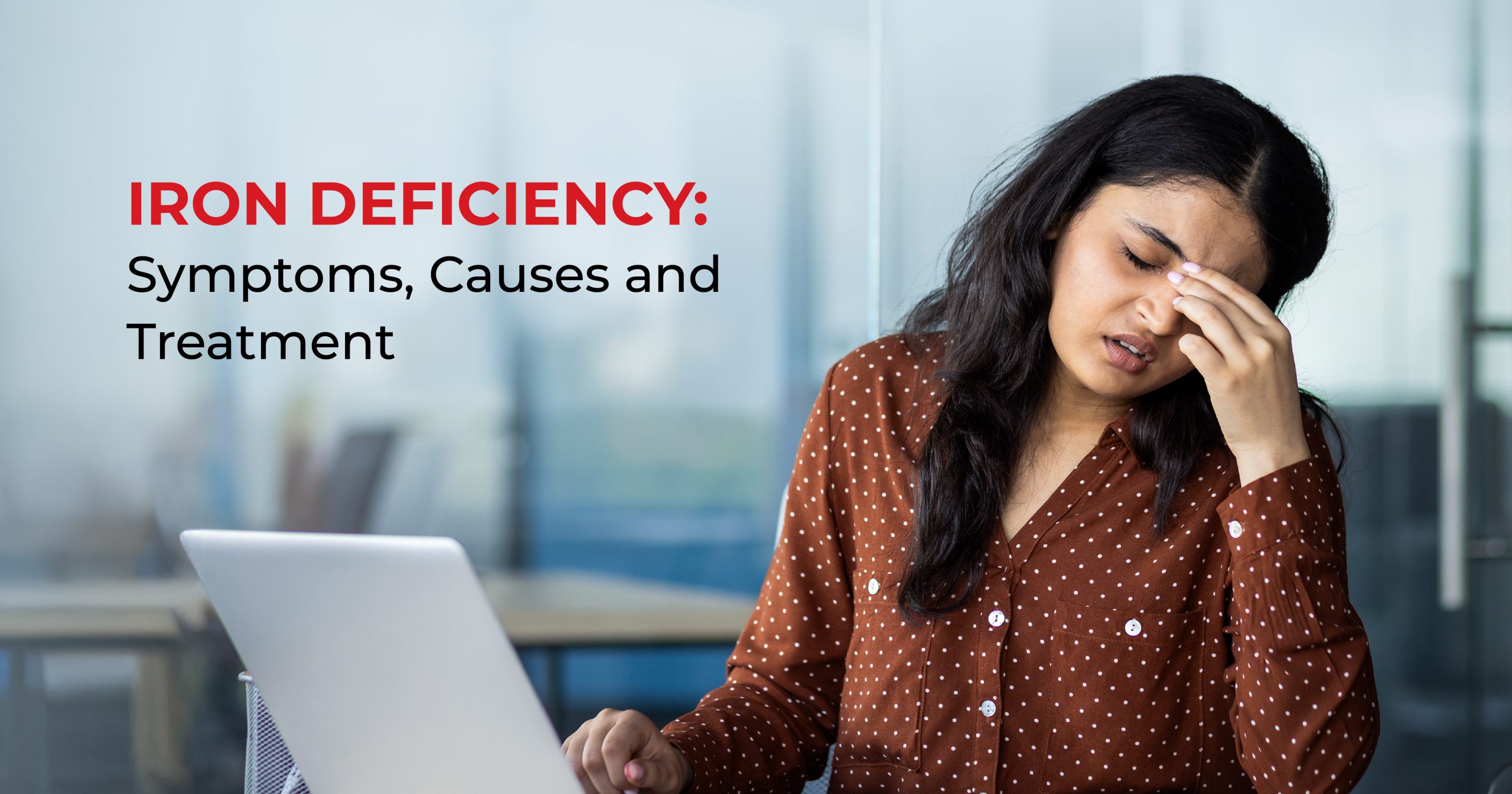Iron Deficiency: Symptoms, Causes and Treatment
Date Created: 14 Nov 2025

Table of Contents
- What is iron deficiency?
- Common symptoms of iron deficiency
- Major causes of iron deficiency
- How to check iron deficiency
- How to treat iron deficiency
- Best foods and fruits for iron deficiency
- Preventing deficiency of iron in the body
- Living well with healthy iron levels
- Conclusion
Globally, about 40% of children under five, 37% of pregnant women, and 30% of women aged 15 to 49 are affected by anaemia, most often due to iron deficiency. Despite being one of the world’s most common nutritional problems, it often goes unnoticed until fatigue, weakness, or poor focus start to take over daily life.
Iron keeps your body energised and your mind sharp. When its levels drop, even simple tasks can feel exhausting. This blog explores the key iron deficiency symptoms, causes, and safe ways to restore healthy levels through diet, lifestyle, and medical guidance.
What is iron deficiency?
Iron is a mineral your body depends on to make red blood cells. These cells carry oxygen to every tissue and organ. When your body doesn’t have enough iron, it struggles to produce healthy red blood cells. This is called iron deficiency.
The condition is common worldwide and can affect people of all ages. When left untreated, it can lead to iron deficiency diseases such as anaemia. Iron is essential not only for oxygen transport but also for maintaining energy, focus, and immune health.
Common symptoms of iron deficiency
Feeling tired all the time is one of the first iron deficiency symptoms people notice. But fatigue is not the only sign. Your body shows several small clues that can easily go unnoticed.
Early signs include:
- Low energy or persistent fatigue
- Pale skin or dark circles under the eyes
- Headaches or dizziness
- Brittle nails or thinning hair
Severe symptoms may include:
- Shortness of breath
- Rapid heartbeat
- Chest pain or light-headedness
- Difficulty concentrating
Iron deficiency symptoms in females often include extreme tiredness, especially during or after menstruation, and hair loss. Many women mistake these for normal hormonal changes, but they can be signs of low iron.
When fatigue, hair fall, or poor focus last for weeks, it’s worth checking your iron levels.
Major causes of iron deficiency
The iron deficiency can vary depending on age, gender, and diet.
1. Poor diet:
Not eating enough foods rich in iron is the most common reason for low levels. Vegetarian or vegan diets, when not balanced, may lead to a deficiency of iron in the body.
2. Increased demand for iron:
Women during pregnancy, breastfeeding, or menstruation need more iron. Teenagers and children also need higher amounts to support growth.
3. Poor absorption:
Certain health conditions, such as coeliac disease or inflammatory bowel disease, can reduce how much iron your body absorbs.
4. Blood loss:
Frequent blood donation, internal bleeding, or heavy menstrual periods are major iron deficiency.
5. Hair loss link:
Yes, iron deficiency causes hair loss. Low iron reduces oxygen supply to hair follicles, slowing growth and increasing shedding.
How to check iron deficiency
You cannot confirm iron deficiency just by symptoms. The only way to know for sure is through a blood test.
Common tests include:
- Haemoglobin test: Checks if your blood has enough oxygen-carrying capacity.
- Ferritin test: Measures how much iron is stored in your body.
- Complete Blood Count (CBC): Gives an overview of your red blood cell health.
If you’re wondering how to check for iron deficiency, ask your doctor for these tests. Never self-diagnose, as other conditions can cause similar fatigue or dizziness.
How to treat iron deficiency
The right approach depends on what’s causing it. Here are some practical ways to treat iron deficiency safely.
1. Improve your diet:
Start by including more iron-rich foods in your meals. Iron from animal sources is absorbed better, but plant-based options can also help when paired with vitamin C-rich foods.
2. Iron supplements:
Doctors may prescribe medicine for iron deficiency if diet alone is not enough. Tablets or syrups are common, but you should only take them under medical advice. Overuse can cause constipation or stomach upset.
3. Address the root cause:
If heavy periods or digestive issues are responsible, your doctor will treat those conditions to prevent recurrence.
If you want to know how to treat iron deficiency, remember that diet, supplements, and medical supervision must work together.
Best foods and fruits for iron deficiency
Food is the most natural way to maintain healthy iron levels. The best foods for iron deficiency include:
- Red meat, liver, and poultry
- Fish and shellfish
- Lentils, chickpeas, and tofu
- Spinach, kale, and pumpkin seeds
Pairing these foods with fruits high in vitamin C helps increase absorption. The fruits for iron deficiency include:
- Oranges
- Strawberries
- Guava
- Kiwi
Avoid drinking tea or coffee right after meals, as they can reduce iron absorption.
Preventing a deficiency of iron in the body
Prevention is always better than a cure. Here are simple ways to avoid a deficiency of iron in the body:
- Eat a balanced diet with both plant and animal sources of iron.
- Include vitamin C-rich fruits daily.
- Manage heavy menstrual bleeding with medical advice.
- Get your blood tested regularly if you belong to a risk group.
Staying consistent with these habits keeps your iron levels stable and prevents fatigue or weakness from returning.
Living well with healthy iron levels
Once your levels are restored, maintenance becomes the key. Continue eating a varied diet, stay hydrated, and follow up with your doctor as advised. Small lifestyle changes, like pairing iron-rich meals with fresh fruit juice, can make a big difference.
Conclusion
At Meridian Enterprises, we recognise how important iron is for maintaining strength and energy. Supporting iron health starts with awareness, nutrition, and timely medical care.
Our Ferrofit Tablet is formulated to help replenish iron levels under professional guidance. It can be part of your healthcare routine when recommended by your doctor. Always consult a healthcare professional before taking any supplement.
Balanced nutrition and medical advice are the most reliable ways to manage iron deficiency and keep your body energised for everyday life.
Recent Posts

Iron Deficiency: Symptoms, Causes and Treatment
Read More...
What is indigestion? All You Need To Know
Read More...

